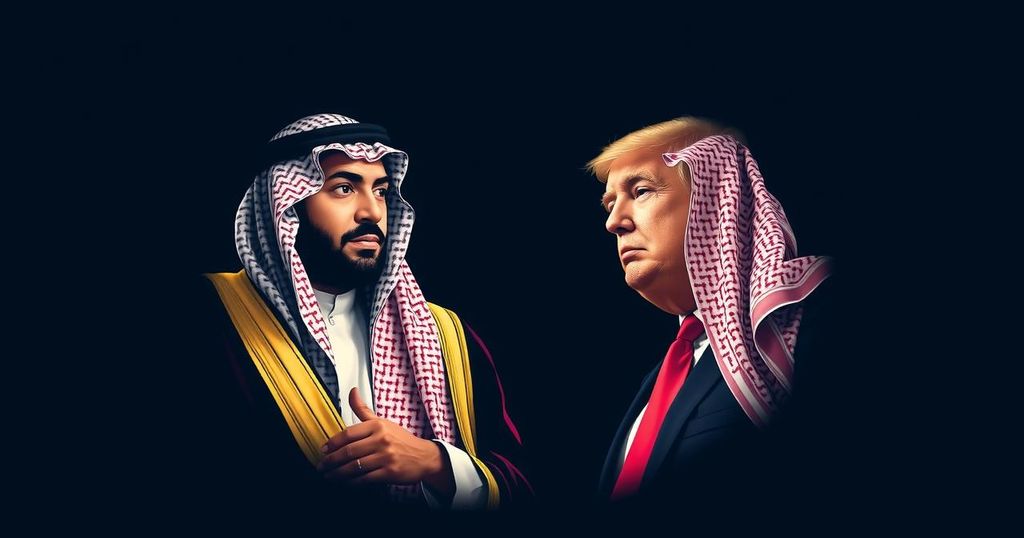Arab leaders have congratulated Donald Trump on his election victory, expressing hopes for an end to Middle Eastern conflicts, particularly in Gaza and Lebanon, while advocating for a stronger stance against Iran. Analysts predict Trump may pressure Israel to resolve ongoing wars before his inauguration, while concerns linger over Israel’s actions in the West Bank and Iran’s role in regional tensions.
Arab leaders have extended their congratulations to Donald Trump following his recent election victory as President of the United States. They express optimism over his potential to resolve longstanding conflicts in the Middle East, while simultaneously advocating for a more robust position against Iran. Key figures such as Saudi Arabia’s King Salman and Crown Prince Mohammed bin Salman, as well as leaders from the United Arab Emirates and Qatar, emphasize the importance of strengthening strategic partnerships with the new administration. Dania Koleilat Khatib, president of the Research Center for Cooperation and Peace Building in Beirut, remarked on Trump’s approach during his campaign, highlighting his preference for personal ties with Middle Eastern leaders over what she characterized as President Joe Biden’s more transactional style. Khatib indicated that Arab leaders anticipate the cessation of hostilities in Gaza and Lebanon, and she questioned the feasibility of Trump’s promise to bring about peace: “One of his main campaign promises was to end the war in Gaza. But end it how? Would it end with a Palestinian state? We don’t know.” Moreover, concerns are rising regarding the potential for Israeli Prime Minister Benjamin Netanyahu to escalate confrontations with Iran under Trump’s leadership. Specifically, Crown Prince Mohammed bin Salman has reiterated that Saudi Arabia will not consider improving relations with Israel unless a resolution is reached in Gaza and a Palestinian state is recognized. Wealthy Gulf states have demonstrated renewed ties with Iran, promising not to permit Israeli airstrikes from their territories. While congratulatory statements have come from leaders such as Jordan’s King Abdullah and Egypt’s Abdel Fattah al-Sisi, who are engaged in peace negotiations, analysts like Osama Al Sharif suggest that Trump may seek to pressure Netanyahu to conclude ongoing conflicts swiftly. He stated, “He will boldly tell Netanyahu … to wrap things up before the 20th of January because those two wars, especially Gaza, have become so toxic.” Furthermore, Al Sharif anticipates that Iran will remain a significant challenge for Trump, whom he describes as an isolationist. He implied that Trump might tighten sanctions against Iran while potentially leveraging communication with Tehran through Russian President Vladimir Putin, who maintains a strong alliance with Iran. However, there is apprehension that Trump’s administration may formally recognize Israel’s annexation of portions of the West Bank, an action detrimental to Palestinian and Jordanian interests.
The article explores the political dynamics following Donald Trump’s election as U.S. President, particularly concerning Arab leaders in the Middle East. These leaders have expressed both congratulations and hopes for an end to ongoing regional conflicts, specifically in Gaza and Lebanon. The piece highlights concerns over Trump’s foreign policy direction regarding Israel and Iran, and it examines the potential implications for peace negotiations and regional stability moving forward.
In conclusion, Arab leaders have welcomed Donald Trump’s election victory with hopes for an effective resolution to conflicts in the Middle East. While expressing optimism for peace initiatives, there remains a palpable concern regarding Trump’s approach to Iran and the ramifications of potential Israeli actions in the region. As the political landscape shifts, the ability of the Trump administration to navigate these complexities will be crucial for future stability in the Middle East.
Original Source: www.voanews.com







